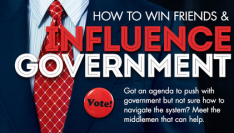How to win friends and influence government
 Got an agenda to push with government but not sure how to navigate the system? Nic Christensen speaks to the people that can help.
Got an agenda to push with government but not sure how to navigate the system? Nic Christensen speaks to the people that can help.
When it comes to the current perception of government lobbying, former politicians such as Labor powerbroker Eddie Obeid and ex-Western Australian Premier Brian Burke have a lot to answer for.
“Lobbying is about as popular as ebola; it’s the Eddie Obeid factor,” says Toby Ralph, who operates as an independent lobbyist. “People assume there are palms being greased, mates being rewarded and that there’s bugger all transparency.”
According to Ralph, the recent hearing of the NSW Independent Commission Against Corruption which found Obeid and fellow former minister Ian MacDonald behaved corruptly in relation to the issuing of mining licences is just the latest of many incidents to damage the reputation of government relations.


Step 1) Keep the people uninformed
Step 2) Openly back a party.
Step 3) Own a lot of media in the target country.